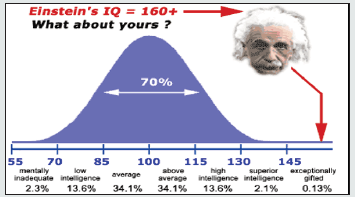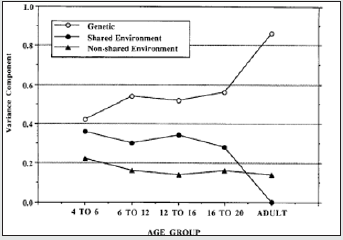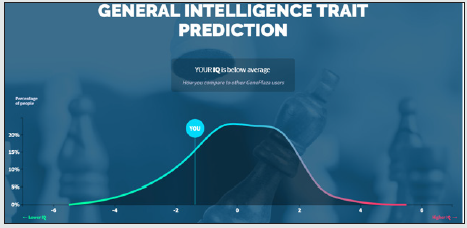
Lupine Publishers Group
Lupine Publishers
Menu
Review Article(ISSN: 2641-6875) 
Genetics and Human Intelligence Volume 2 - Issue 3
Munmun Banerjee1 and Priti Mathur1*
- 1Amity Institute of Biotechnology, Amity University Uttar Pradesh, India
Received:August 14, 2021; Published:September 21, 2021
*Corresponding author: Priti Mathur, Amity Institute of Biotechnology, Amity University Uttar Pradesh, Lucknow-226028, India
DOI: 10.32474/CTBM.2021.02.000138
Abstract
High intelligence is a valuable human capital that is correlated with success in one’s life. Human intelligence is governed by genetics as well as environmental factors. Recent studies indicate that contribution of genetics to intelligence is greater as compared to environment. Based on the above facts, we have gone through literature available on this topic. In this review article, we have focused on the genetic factors which influence human intelligence. Intelligence, in terms of IQ, is a polygenic trait and counting of genes linked to intelligence thus continues. Heritability of human intelligence increases with age. Genes of intelligence can protect a person from certain disorders but increase the vulnerability towards other disorders. Nowadays, Gene Plaza and DNA Land can predict the genetic IQ of a person. Few studies so far have been done on human intelligence and its relation with genetics. Hence, intense research is required to explore the genetics of human intelligence.
Keywords:Human intelligence; Genetics; IQ; Polygenic
Introduction
Human intelligence has evolved from being “reactive” to “proactive”. Intelligence is a complex psychological trait. It includes abilities of reasoning, logical planning and problem- solving. It also involves the skills of thinking abstractly, apprehending useful data and other complex ideas. Learning quickly and retaining knowledge gained from information resources as well as experience is important. Application of this knowledge to get adapted to one’s surroundings in life is also an essential element of intelligence. Not only genetics, but environmental factors like a child’s parenting, environment at home, educational qualification, exposure to stimulating situations and nutrition also play a significant role in nurturing and shaping intelligence. Thus, intelligence is the product of interaction between genetics and environment [1-4]. This review article focuses only on the genetic influence on intelligence. It has been stated in a letter entitled “Mainstream Science on Intelligence”, signed by 52 famous intelligence experts that the role of genetics in bringing about IQ differences among individuals is more significant as compared to that of environment. Various studies hold genes responsible for 50-70% of these IQ variations.
The Intelligence Quotient (IQ)
Intelligence is measured in terms of Intelligence Quotient (IQ). IQ tests measure ‘g’ (general factor of intelligence). People with better mathematical, spatial reasoning and language skills and with good power of memory retention have greater g and thus, higher IQ. The higher the g, the higher are the chances of success and vice versa. The g factor is also connected with health and life span [5].
In Figure 1, X- axis represents the IQ scores ranging from 55 to above 140. Y-axis represents the percentage of people with IQ scores within certain limits denoted on X-axis. Those with an IQ score of a value between 55 and 70 are categorized as “mentally inadequate”. IQ score over 140 denotes that a person is “exceptionally gifted” or “genius”. From the figure, it is evident that most of the people have IQ scores within the range of 85 to 115. The IQs of monozygotic twins correlate at 0.76 (average value), when they are raised in different surroundings while this correlation is 0.86, [6] if they are brought up in the same home. It implies that segregation of these twins does not drastically affect their IQ correlation because they share same DNA [7].
Intelligence- A Polygenic Trait
Intelligence is governed by multiple genes, that is, it is a polygenic trait. Intelligence genes are mostly expressed in “mediumspiny neurons”. Each gene exerts extremely small effect, either enhancing intelligence or reducing it. Also, genes cause their effect at different stages of development of intelligence. But these little effects may add up to produce large impact on functioning of brain and cognitive abilities during critical stages of brain development [5, 8].
Assortative mating or homogamy is significant for polygenic traits like human intelligence as it contributes to high heritability of human intelligence by infusing additive genetic variance. Assortative mating is approximately 0.40 for intelligence, which is higher as compared to that for other traits like height and weight (about 0.20) and personality (about 0.10). For verbal intelligence, it is nearly 0.50 and is greater than that for non-verbal intelligence (~0.30) [2,9].
Maternal Effect
According to a research published in “THE INDEPENDENT” (on 2nd February 2017), genes of intelligence are located on X chromosome and belong to the category of “conditioned genes”. They are inherited by a child from his/ her mother as a woman has 2 X chromosomes (XX). As men have single X chromosome (XY), a father is less likely to pass over these genes to his child. Also, it has been stated that automatic deactivation of genes for advanced cognitive functions that are transmitted by father to child may take place. Thus, a mother’s genetics has greater influence on intelligence of her child [10].
The Wilson Effect
Though intelligence of a human is genetically stable throughout his life, but genetic influence on intelligence increases with time; being about 20% in infancy to 40% in childhood and reaching upto 60% in adulthood. This might also increase upto 80% in later adulthood and then lowering down to 60% after 80 years of age. Thus, heritability of intelligence increases linearly with age (generally); this is known as Wilson Effect [9]. In Figure 2, X- axis represents the different age groups; starting from age group of “4 TO 6” years and ending at adulthood where age exceeds 20 years. The Y-axis represents the IQ variance component. These estimates have been obtained from published IQ twin correlations. The impact of the various factors categorized as genetic, shared environment and non-environment has been assessed.
It has been observed that influence of environmental factors on intelligence becomes almost negligible by young adulthood. So, where and how the person was brought up basically provides no clue to the reason behind IQ variance in adult populace. The genetically gifted people are those with “high IQ genes”. They have an inclination towards cognitively rich environments. The people deprived of these genes, choose environment that is suitable for the ones with low IQ. Hence, parents can provide a home environment that is conducive to high IQ as long as the child stays with them. But once the child steps out of home, he/she will eventually end up choosing an environment corresponding to their genotypic IQ [11].
Counting Genes Underlying Intelligence
By August 2017, 336 SNPs (Single Nucleotide Polymorphisms) out of greater than 12 million of them analysed, had been found associated with intelligence, implicating 22 different genes. Scientists also identified that one of those genes is involved in regulation of growth of neurons; another is correlated with intellectual disorder and cerebral disfigurement [12]. FOXO3 gene that controls insulin signalling (which might initiate apoptosis) contains the most important SNP according to a study. CSE1L gene that governs apoptosis and cell proliferation is strongest intelligence- linked gene. Overall, the SNPS are deemed for 5% differences in intelligence among population [4,13].
Danielle Posthuma, statistical geneticist at Vrije University in Amsterdam (Netherlands) led a group of scientists in 2017 that discovered 15 novel loci and 40 novel intelligence- linked genes and also identified 3 loci implicating 12 genes which had earlier been linked to cognitive abilities. Many of these genes (like DCC, NEGR1, MEF2C etc.) control neuronal functioning like regulating growth and differentiation of neurons. In 2018, another study of 14 databases (containing health and genetic records) led by her, 939 novel intelligence-associated genes were identified by team of researchers. The results of this study also indicated that genes of intelligence protect a person from disorders like Alzheimer’s disease and schizophrenia and ensure longevity of life but simultaneously, increase the risk for autism [8, 14].
A review article published in “Frontiers in Human Neuroscience” (on 15th February 2019) states that the largest genetic association of intelligence has recently discovered 206 genomic loci for 1,041 genes. This has added 191 novel loci for 963 novel genes to the previous ones related to cognitive abilities [2].
DNA IQ Tests
Robert Plomin, an American behavioral geneticist who is a deputy director of the MRC Social, Genetic and Developmental Psychiatry at King’s College London, has concluded from his substantial study of 13,000 pairs of British twins- “The discoveries mean we can now read the DNA of a young child and get a notion of how intelligent he/she will be.” In fact, websites like GenePlaza and DNA Land are offering service of determining genetic IQ of a person from his spit sample. However, results can predict mere 5 points of IQ and hence much about the genetic IQ remains unrevealed; such disclaimers are displayed with results on GenePlaza. This is because in a personal DNA IQ test, polygenic scores indicate IQ. These scores are obtained as the sum of all the positives and negatives found in a person’s genome. Since they only predict intelligence determined by a fraction of genetic factors and ignore all environmental factors, there is lack of accuracy and thus, these scores are not totally reliable [5].
In Figure 3, X- axis represents the IQ score and Y-axis represents the percentage of people. In this way, GenePlaza compares the genetic IQ of a person with other people and states the IQ level of the person.
Intelligent Embryos
Few medical scientists are now working on a mission to identify the “smartest”, that is, the most “intelligent” human embryo amongst the embryos formed by In vitro Fertilisation (IVF) technique. Late Sir Stephen Hawking, the renowned theoretical physicist, stated his worry regarding division of humanity into “genetic- haves and have- nots”. He believed that the privileged sections of society would use gene- editing to create a ‘superhuman race’ that would be superior to others in terms of intelligence and would live longer. George Church, Professor of Genetics at Harvard Medical College, also fears the inequality that could arise from such scientific advancements. However, he supports the idea to make gene editing technologies affordable in order to ensure that it is available to all. He favors genetic engineering of embryos for intelligence such that it can increase nearly 15 points of IQ.
Conclusion
Human intelligence is largely determined by genetics, with its heritability at peak during adulthood. Though environmental factors impact IQ to an extent lower as compared to genetics, but they cannot be ignored. So, the genotypic IQ tests of a person can be relevant to measure intelligence only when all the genes linked to intelligence have been identified so that the polygenic scores can be accessed accordingly. In order to predict the exact IQ, effects exerted by environment should also be taken into consideration. Transmission of genes of intelligence from mother to child has been found more plausible. Intelligence genes not only concern mental abilities but also our health status. Thus, genetics involved in IQ variations is immensely important and more research is awaited in this field.
References
- Ian J Deary, Frank M Spinath Timothy C Bates (2006) Genetics of intelligence. European Journal of Human Genetics 14: 690-700.
- Natalia A, Goriounova, Huibert D, Mansvelder (2019) Genes, Cells and Brain Areas of Intelligence. Frontiers in Human Neuroscience.
- Is intelligence determined by genetics?
- Alexander P. Burgoyne, David Z, Hambrick (2017) Intelligence and the DNA Revolution. Scientific American.
- R Plomin, Deary IJ, (2014) Genetics and intelligence differences: five special findings. Mol Psychiatry 20(1): 98-108.
- Charlotte England (2017) Children inherit their intelligence from their mother not their father, say scientists. The Independent.
- Carl Zimmer (2017) In ‘Enormous Success,’ Scientists Tie 52 Genes to Human Intelligence. The New York Times.
- Matt McGue, Thomas J, Bouchard, William G, Iacono, et al. (1993) Behavioral genetics of cognitive ability: A life-span perspective. American Psychological Association 64.
- Raffaele Ferrari (2017) Large study uncovers genes linked to intelligence. THE CONVERSATION.
- Antonio Regalado (2018) DNA tests for IQ are coming, but it might not be smart to take one. MIT Technology Review.
- Ryan Faulk (2016) The Heritability of IQ. The Alternative Hypothesis.
- Ann Gibbons, (2018) Hundreds of new genes may underlie intelligence-but also autism and depression.
- Massive GWAS Reveals 40 New “Intelligence” Genes. (2017) ALZFORUM.
- History Chick (2017) GenePlaza Review. Genealogical Musings.
- Rachel Cocker (2019) We should not fear 'editing' embryos to enhance human intelligence, says leading geneticist George Church. The Telegraph.

Top Editors
-

Mark E Smith
Bio chemistry
University of Texas Medical Branch, USA -

Lawrence A Presley
Department of Criminal Justice
Liberty University, USA -

Thomas W Miller
Department of Psychiatry
University of Kentucky, USA -

Gjumrakch Aliev
Department of Medicine
Gally International Biomedical Research & Consulting LLC, USA -

Christopher Bryant
Department of Urbanisation and Agricultural
Montreal university, USA -

Robert William Frare
Oral & Maxillofacial Pathology
New York University, USA -

Rudolph Modesto Navari
Gastroenterology and Hepatology
University of Alabama, UK -

Andrew Hague
Department of Medicine
Universities of Bradford, UK -

George Gregory Buttigieg
Maltese College of Obstetrics and Gynaecology, Europe -

Chen-Hsiung Yeh
Oncology
Circulogene Theranostics, England -
.png)
Emilio Bucio-Carrillo
Radiation Chemistry
National University of Mexico, USA -
.jpg)
Casey J Grenier
Analytical Chemistry
Wentworth Institute of Technology, USA -
Hany Atalah
Minimally Invasive Surgery
Mercer University school of Medicine, USA -

Abu-Hussein Muhamad
Pediatric Dentistry
University of Athens , Greece

The annual scholar awards from Lupine Publishers honor a selected number Read More...








